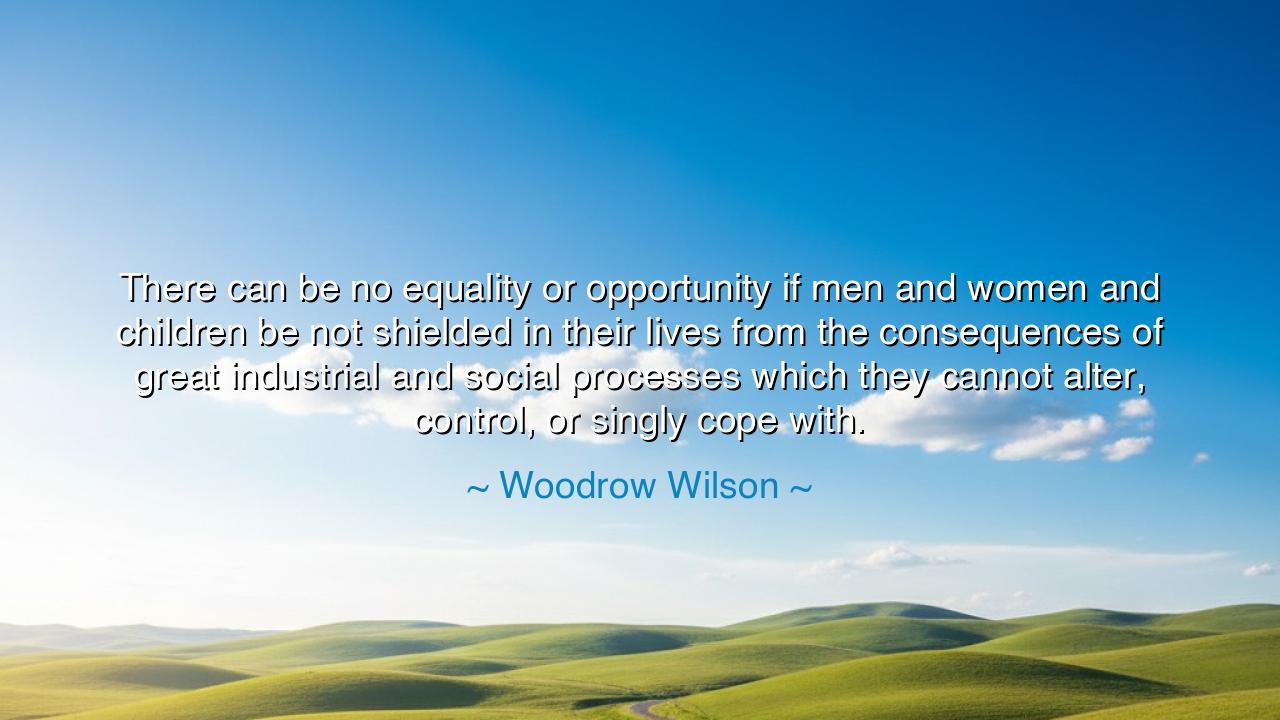
There can be no equality or opportunity if men and women and
There can be no equality or opportunity if men and women and children be not shielded in their lives from the consequences of great industrial and social processes which they cannot alter, control, or singly cope with.






The words of Woodrow Wilson—“There can be no equality or opportunity if men and women and children be not shielded in their lives from the consequences of great industrial and social processes which they cannot alter, control, or singly cope with”—speak to the eternal struggle between the might of systems and the frailty of the individual. These words, uttered in the age when machines began to roar and empires of industry rose like new gods, carry a truth that transcends their century. They tell us that freedom without protection is a mirage, and equality without compassion is a hollow boast. For what good is liberty to those crushed beneath the wheels of progress, or opportunity to those too poor, too sick, or too weary to reach for it?
In Wilson’s era, the furnaces of industry blazed through the night, and the world’s heartbeat quickened to the rhythm of iron and steam. Men worked until their bodies failed, women toiled for pennies, and children—small and frail—breathed coal dust instead of air. The industrial and social processes of which Wilson spoke were mighty engines—economic and political forces that shaped destinies beyond the grasp of any single hand. His words were a cry for justice: that governments, born of the people, must act as shields for the vulnerable, lest power devour its own creators.
The truth of his warning shines in the story of the Triangle Shirtwaist Factory fire of 1911. In that inferno, over a hundred young women perished, trapped behind locked doors meant to keep them from leaving their posts. They leapt from burning windows as the city watched in horror. Their deaths were not fate, but the consequence of unchecked greed, of systems unrestrained by conscience. And it was only after their sacrifice that laws began to change—that safety, fairness, and dignity became rights rather than privileges. Thus Wilson’s words came alive: to shield life from the cruelty of great processes is the foundation of true equality.
Throughout history, whenever nations have forgotten this balance, suffering has followed. The empires that glorified wealth without justice, that exalted machines over men, have fallen into ruin. For the human spirit, though resilient, cannot forever endure oppression disguised as progress. Even in our own time, as the gears of technology turn faster than ever before, we see the same danger rising: people overwhelmed by systems they did not design, by markets and machines they cannot control. Wilson’s wisdom whispers through the ages—that civilization must serve humanity, not enslave it.
To shield is not to weaken; it is to honor the sacred worth of life. Just as a shepherd guards his flock not out of pity, but out of duty, so too must societies guard their people from forces too vast for any one person to withstand. A nation that forgets this truth forgets its soul. Equality cannot flourish in a world where only the strong survive; opportunity cannot bloom where despair is sown.
The lesson, then, is both simple and profound: compassion is the cornerstone of justice. If you would build a just world, begin by protecting those who cannot protect themselves. Demand that the fruits of progress nourish all, not merely the few. Let your labor, your learning, your voice be used to bend the great machinery of society toward mercy. For no invention, no empire, no prosperity is noble if it crushes the weak beneath its weight.
And so, let these words be carried forward as a sacred teaching: that true equality requires guardianship, and that every generation must renew the shield for those who come after. When power grows mighty and the world spins beyond our grasp, let us remember that the measure of a civilization is not in its wealth or its wonders, but in how tenderly it protects its most fragile souls. Only then shall the promise of opportunity and equality—the promise Wilson fought to preserve—shine as bright as the dawn over a just and merciful world.






AAdministratorAdministrator
Welcome, honored guests. Please leave a comment, we will respond soon